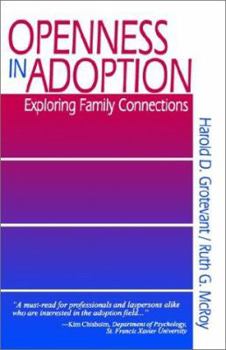Openness in Adoption: Exploring Family Connections
Since the mid-1970s, adoption practices in the United States have changed dramatically, and the confidentiality maintained in the past is no longer the norm. The trend is toward openness in adoption in which either mediated (through an adoption agency) or direct contact occurs between the adoptive family and birth parent(s). Some adoption professionals argue that openness is harmful and experimental while others argue that the secrecy of confidential adoptions has been harmful to all parties involved. Who s right? In Openness in Adoption, this question is addressed via a nationwide study of 720 individuals (190 adoptive fathers, 190 adoptive mothers, 171 adopted children, and 169 birthmothers) that was conducted over a five-year period. The book begins by presenting the issues and debates surrounding open adoptions and then examines them from the perspective of the adopted children, adoptive parents, and birth mothers. The volume concludes with implications for adoption practice, public policy, and future research. A groundbreaking volume, Openness in Adoption provides a wealth of information to professionals and practitioners in the fields of family studies, sociology, developmental psychology, social work, clinical psychology, and social psychology.
Format:Paperback
Language:English
ISBN:0803957793
ISBN13:9780803957794
Release Date:June 1998
Publisher:Sage Publications
Length:239 Pages
Weight:0.75 lbs.
Dimensions:0.6" x 4.7" x 8.3"
Customer Reviews
1 rating
Hard facts about the effects of OA
Published by Thriftbooks.com User , 24 years ago
Finally, open adoption gets its due in this comprehensive study of its effects on all triad members. The research seems to prove that more openness is better; and that adoptees who have ongoing relationships with their birthfamilies have stronger, better bonds with their adoptive families, too. This isn't easy reading--as the results of a research study, it's written in academic style--but it should still be required reading for all prospective adoptive parents.






